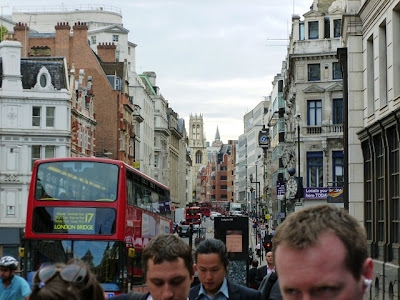The boy at the center of the case had been eight years old when he first sought asylum in the UK. His uncle and his uncle's wife, a childless couple, arranged for the boy to come live with them after the Taliban killed his parents in Afghanistan. Immigration officials felt his story was not quite right. Instead of allowing him to wiggle his roots down into safe British soil as a permanent resident, they granted him temporary status until he reached the age of seventeen and a half. He could live with his uncle for nine and a half years.
Something was not quite right, wrote the immigration agent sitting below me on the Tube. Standing above her, I swayed back and forth with the other upright passengers as we rode from Heathrow to King's Cross station in London. She wrote in a looping longhand style with a yellow pencil, then erased heartily, with the conviction of a first grader. Bits of pink erasure dandruff clung to the hips of her black suit skirt.
When she felt called to make notes on the legal documents in the files stacked up on her lap, it interrupted my reading. She bent so far forward over her work, the label on her skirt poked out like a tongue. She blocked my view of her confidential notes. Fortunately, she spent more time reading than writing. We were underground now, somewhere east of Kew, and I had already read all of the advertisements around the top edge of this train. None were as interesting as watching the rejection of an immigration case in a country not my own. She leaned back to appraise her own scrawl, and I continued my visual eavesdropping.
What was "not right," as the British government discovered, was that the uncle was actually the boy's father. The uncle/father left Afghanistan, left the boy's mother there, pregnant, ducking behind sand colored cinderblock walls for safety, and he moved into Europe, to England, to a walk-up flat in Tottenham with a damp foyer that smelled of curried eggs. The papers did not document this. The papers acknowledged the DNA connection between boy and uncle/father. I imagined the rest.
The immigration agent wrote with passion and energy; she rocked her feet up on her toes when she bore down on the paper. She scrawled something on one page, then sat back and held the pages up to face what she'd written at eye level. These deceptions by the uncle/father not only jeopardized the safety of the boy, but also put the uncle/father's wife's status at risk. Currently in the UK with temporary status, the wife also wanted to stay, despite the three flights of stairs she had to walk up carrying reusable Tesla bags full of rice and onions; despite the curried egg smell in the foyer. She wanted to stay.
Did the uncle/father's wife know the truth of the relationship between the boy and the uncle/father? Did she know the dead mother back in Afghanistan? The British government could not determine how much the woman knew; their uncertainty about her role in the drama tipped the case against her. We clacked back and forth on our passage. The man next to the immigration agent slept with his head tilted forward, his arms crossed against his chest as if to lock himself into a polite space on the row of seats.
The British government also failed to determine the exact age of the boy. His mother dead, his uncle/father a liar, they wanted to believe the boy when he showed up at the border and held up eight fingers. That was seven years ago; now other evidence (not specified) indicated he may have been nine, or even ten. He was so thin, so drawn, when he held up his fingers at the border. The circles under his eyes were caves. The papers did not document this, either.
He could not stay. His father/uncle had lied. There were holes in the story. There were undocumented elements of the case. The immigration agent held the end of the pencil to her lips as if to shush someone. Because the boy could stay in this safer country until he turned seventeen and a half, the British government had to give him an age, but he would still be eventually returned to Afghanistan. They decided to call him fifteen. He could live with his uncle/father, a permanent resident, for two and a half more years. As for the uncle/father's wife, she would have her papers revoked. She would be deported immediately for her connection to such tenuous and uncertain ties.
The immigration agent bent over her papers to scrawl something in the block of white space across the bottom of the last page of neat legal type. As the automated Tube voice announced King's Cross as the next station, the man next to her woke up and rubbed his fists into his eyes. She slid her stack of papers into a worn, black briefcase with tape on the clasp. She had written: What a pity.










